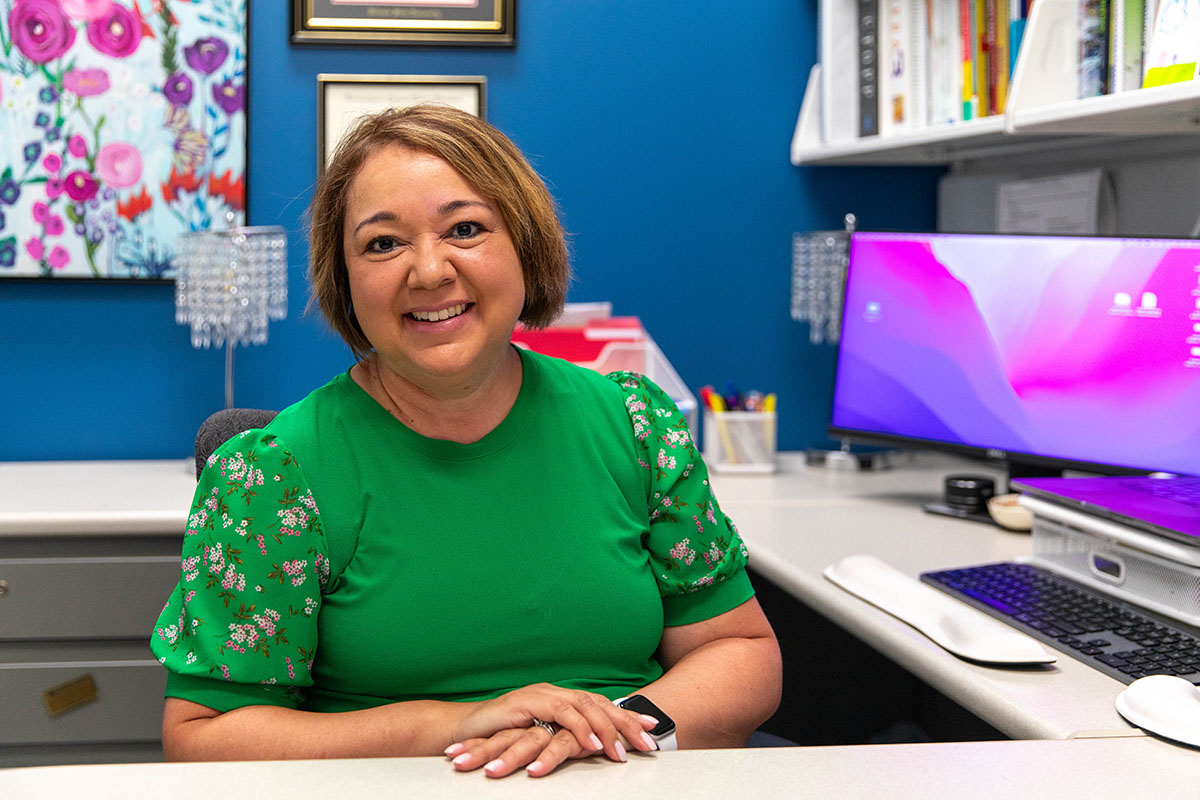 Elia Olivares is the director of culturally and linguistically diverse programs in DePaul’s speech-language pathology program (Photo by Keeton Holder/DePaul University)Chicago is one of the most diverse cities in the nation. According to 2020 census data, about one-third of city residents ages five and older speak a language other than English at home, with Spanish as the second most common language used across the city. And while nearly 25% of Chicagoans speak Spanish as their first language, Elia Olivares, director of culturally and linguistically diverse programs in DePaul’s speech-language pathology program, notes there often is a gap in health and education services provided to the community.
Elia Olivares is the director of culturally and linguistically diverse programs in DePaul’s speech-language pathology program (Photo by Keeton Holder/DePaul University)Chicago is one of the most diverse cities in the nation. According to 2020 census data, about one-third of city residents ages five and older speak a language other than English at home, with Spanish as the second most common language used across the city. And while nearly 25% of Chicagoans speak Spanish as their first language, Elia Olivares, director of culturally and linguistically diverse programs in DePaul’s speech-language pathology program, notes there often is a gap in health and education services provided to the community.
“Speech-language pathologists diagnose and treat speech, language and swallowing disorders in both children and adults. It can become much more difficult to effectively communicate, let alone evaluate for speech disorders or other issues, when there is a language barrier between therapists and patients,” Olivares says.
Asking the fundamental Vincentian question of “What must be done?”, Olivares developed the first
Bilingual English-Spanish Specialization Certificate in Illinois. Designed to be completed with the speech-language pathology master’s degree in the College of Science and Health, the certificate not only helps students hone their languages skills, but it also offers candidates experience in cultural responsiveness and advocacy. It also requires students to complete externships and spend additional hours with bilingual clients at the
DePaul Speech and Language Clinic.
With the second cohort of SLP and certificate candidates set to graduate this spring, Olivares says interest in the certificate program has grown.
“In addition to DePaul SLP students, I have had practicing professionals reach out with interest in returning to school to earn this certification,” she says. “I’ve also had conversations with interested students whose second language is not Spanish. Students who speak languages other than Spanish and English can enroll in the SLP Multicultural-Multilingual Certificate for more in-depth coursework specific to working with multilingual clients.”
More recently, the Bridging Bilingual (English-Spanish) Certificate in speech language pathology was approved to prepare currently licensed and certified speech language pathologists who speak Spanish.
As Blue Demons work through their professional and academic opportunities on campus, Olivares also hopes to deepen the SLP program’s impact on the surrounding community with the Speech and Language Clinic. From preventative screenings to individual and group therapy, services through the clinic are no-cost, donation-based and available to people of all ages.
“Under the supervision of faculty, our graduate students operate services at the clinic and aim to provide the community with assistance on a range of issues,” Olivares says. “This includes everything from fine-tuning receptive and expressive languages skills to gender affirming voice care. This is an important opportunity for our students to gain hands-on experience, but also an amazing resource for the Chicago community, especially for those in need of bilingual therapists.”